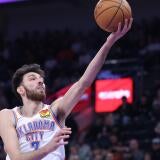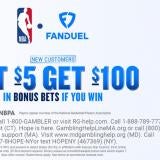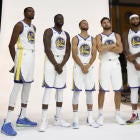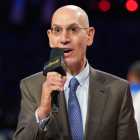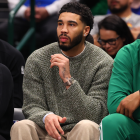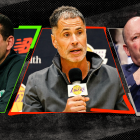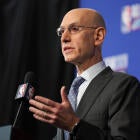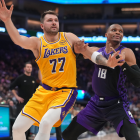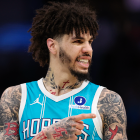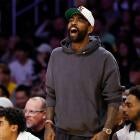Every NBA Western Conference team's best- and worst-case scenario: If Warriors slip it could lead to trouble
Here's what will happen if everything goes right (or wrong) for each team in the West
Once again, we begin an NBA season where the ending feels like a foregone conclusion from the beginning: The Golden State Warriors are going to win the 2018-19 NBA championship.
Las Vegas has the Warriors as the overwhelming favorites, just like last season. And it makes sense. The Warriors have won the championship three out of the last four years, and if it weren't for an errant Draymond Green kick to the groin back in the 2016 Finals, it almost certainly would have been four in a row. If the offseason acquisition of DeMarcus Cousins works out like it could -- i.e., if Boogie returns from his Achilles injury looking no worse for wear, and if age or injuries don't catch up to any of the Warriors' other key pieces -- the Warriors have a chance to be the best version we've seen from what could end up as the greatest dynasty in NBA history. Scary, scary stuff.
But just because one team is the overwhelming favorite doesn't mean there isn't an enormous amount of doubt and intrigue going into the season. Quite the contrary. The Western Conference is piled with intrigue. The Houston Rockets ended last season on a bitter note, coming so close to toppling the Warriors, and their core returns. Can they puncture the Warriors' dynasty? The Utah Jazz looked downright terrifying defensively during the second half of last season; Donovan Mitchell is an absolute star. The Oklahoma City Thunder might have laid an egg in the playoffs, but when their four most important players were healthy and playing together - Russell Westbrook, Paul George, Steven Adams and Andre Roberson - the Thunder were beastly. And plenty more teams, from the Dallas Mavericks (now with future superstar Luka Doncic) to the Los Angeles Lakers (now with that one guy from Akron, Ohio) have a completely different makeup.
As they say, the fun isn't always in the destination. It's in the journey. And we have no idea where this NBA season is going to take us.
Here are a few guesses, though for the best-case and worst-case scenarios for every team in the Western Conference.
Are all these scenarios realistic? I think so. But there will always be surprises. Like a year ago, nobody would have guessed the Jazz so quickly rebounding from Gordon Hayward leaving, or the Indiana Pacers turning into an Eastern Conference threat on the back of All-Star Victor Oladipo.
(Note: We're not counting severe injuries plaguing a team among worst-case scenarios, but we are taking into account players with injury histories.)
For every Eastern Conference team's best- and worst-case scenario, click here
 Dallas Mavericks
Dallas Mavericks
Best Case: Reprising his remarkable EuroLeague performance from last season, Luka Doncic wins the Rookie of the Year award and looks like the best young playmaker in the NBA. The rest of the team gels perfectly around him. Dennis Smith Jr. utilizes his supreme athleticism both on and off the ball, DeAndre Jordan reverts to the dominant defensive force he was a few years ago, and Harrison Barnes takes a step in the direction of superstar as Doncic's playmaking nudges him upward of 23 points per game. The Mavericks are the most unlikely playoff team in the NBA as they nab the eighth seed in the stacked West. Better yet, the Mavericks' youthful progress comes just in time for an excellent crop of 2019 free agents – and the Mavericks have among the most amount of cap space in the NBA.
Worst Case: Doncic is good but not great, overshadowed in the Rookie of the Year race by a half-dozen other rookies. Smith Jr.'s shooting doesn't improve, and Jordan's age has fully caught up with him. The Mavericks miss the playoffs then get lucky and win the lottery for the No. 1 overall pick in the 2019 draft. Unfortunately, that pick was already traded to the Atlanta Hawks in the Doncic trade. Mark Cuban is inconsolable as the Hawks now have two of the top three picks in the 2019 draft.
 Denver Nuggets
Denver Nuggets
Best Case: One of the NBA's most exciting offensive teams last season – only four teams scored more points than the Nuggets – becomes even more dynamic as Nikola Jokic becomes a surprise All-Star in just his fourth NBA season. Jokic averages more than seven assists per game, becoming the first center to average that many assists since Wilt Chamberlain in 1967-68. The rest of the team's young core rises along with him, as Jamal Murray looks like not just an elite scorer but a capable NBA point guard, Gary Harris shoots 40 percent from 3-point range on seven attempts a game while playing improved defense, and a healthy Michael Porter Jr. looks like an absolute steal with the 14th pick in the 2018 draft. Their defense still isn't great, but it's much improved after they get a full season from Paul Millsap. The Nuggets get a No. 5 seed in the playoffs, and although they are bounced in a seven-game first-round series by the Los Angeles Lakers and the playoff dominance that is LeBron James, they are widely considered one of the best young teams in the NBA.
Worst Case: That moribund defense somehow gets worse, dipping from the 25th-ranked defense in the NBA to 28th. All the excitement on offense can't conquer that bad of a defense, and the Nuggets regress from a year ago, winning 42 games and not even sniffing the playoffs. Murray shows flashes at point guard but it becomes clear by midseason that he's never going to be a facilitator. An injured Porter doesn't even see a minute of playing time. The young pieces still give the Nuggets an intriguing future, but a season that was supposed to be a bit of a coming-out party turns into a lost year.
 Golden State Warriors
Golden State Warriors
Best Case: Everything works how it's supposed to work. The Warriors are perfectly healthy all season, and the only real competition for MVP is between two teammates, Kevin Durant and Steph Curry. Draymond Green's 2017-18 regression looks like an aberration as he wins Defensive Player of the Year, Jordan Bell continues to look like a perfect fit and an absolute steal in the 2017 draft, and DeMarcus Cousins returns in February looking like the Boogie of old in terms of production but having turned a new leaf as far as being an even-keeled teammate. The Warriors are, somehow, the best version of themselves that we've seen to date. In March, it seems as if they have a chance to again set the regular season wins record, but Steve Kerr eases off the gas in order to give his players some rest, and they finish with 70 wins. They don't lose a game in the playoffs. On the court afterward, Klay Thompson and Durant pinky swear to finish their career with the Warriors and turn this into the greatest dynasty in modern sports history.
Worst Case: A realistic worst-case scenario for this team could be this: "Stumble in the regular season, struggle through a few seven-games series in the playoffs, still win the title." But basketball can be funny sometimes, and dynasties can go downhill when you least see it coming. This worst-case scenario is a little different: The Warriors' best players are bit by the injury bug at the exact same time during the regular season, as both Curry and Durant play the fewest games they have in a season in four years (51 and 62, respectively). Those injuries turn into a .500 stretch of basketball that lasts for most of January and February, and by the time the team is healthy again, the No. 1 seed is completely out of reach. Cousins returns in late February, and the Warriors must reintegrate all three All-Stars – Curry, Durant and Cousins – into the rotation at the same time. It takes a while to jive, and Cousins looks like he's lost a step, as many other stars have after an Achilles tear. Meanwhile, the locker room issues that were hinted at during last year's NBA Finals burst into the open despite Kerr's best efforts. The Warriors still gain a No. 3 seed in the brutal West, and they still sneak past LeBron's Lakers in the first round and the surging Utah Jazz in the second round, but the top-seeded Houston Rockets are just too hungry for vengeance. Chris Paul and James Harden both play the playoff series of their careers, and the Warriors lose in six. Weeks after the emotional season ends, Durant announces he's opting out of his contract and plans to sign elsewhere.
 Houston Rockets
Houston Rockets
Best Case: Daryl Morey finally does it. The Rockets' crushing seven-game loss to the Warriors in 2018 ends up galvanizing this group to reach the next level in the 2019 playoffs. A big reason why: Carmelo Anthony, in a role as a bench spark, becomes an efficient scorer and shoots a career-high 43 percent from 3-point range. Meanwhile, Eric Gordon thrives in a starting role as the Rockets again boast the NBA's most formidable offense, breaking last season's three-point shooting records. A midseason injury to James Harden – a broken finger on his non-shooting hand – destroys the Rockets' chance at getting home-court advantage in the playoffs, but it has the hidden advantage of keeping Harden's legs fresh for the playoff run. Trevor Ariza is bought out by the Phoenix Suns and returns to the Rockets to give them a late-season defensive spark. In the playoffs, the Rockets' big three – Harden, Chris Paul and Clint Capela – are perfectly healthy, and they dominate. Home-court advantage doesn't matter one bit in the Western Conference playoffs, as the Rockets close out the Warriors in Game 6 in Houston. Harden overcomes his playoff reputation by averaging 35 points per game in the Finals and winning Finals MVP, and Paul kisses the Larry O'Brien Trophy for the first time after a five-game romp over the Celtics.
Worst Case: All the offseason moves send the Rockets in the wrong direction. It turns out Anthony's 2017-18 season was the beginning of a swift decline, not some aberration. Despite his defense being terrible, his scoring a bit less efficient and his on-off stats the worst on the team, he still publicly sulks at his increasingly limited role. The sulking rubs off on his buddy Paul, who takes Melo's side over the other locker room contingent of Mike D'Antoni and Harden. The offseason losses of Ariza and Luc Mbah a Moute, not to mention assistant coach and defensive wizard Jeff Bzdelik, turn the league's seventh-ranked defense last season into one that barely sits inside the top 20. The Rockets still manage to get the No. 3 seed in a clogged West, but in a rematch of last season's Western Conference semifinals, the Rockets get knocked out in five games by the ascendant Utah Jazz, who grabbed the No. 2 seed.
 Los Angeles Clippers
Los Angeles Clippers
Best Case: Despite not having a traditional star, the Clippers boast the NBA's deepest roster, and that goes a long way to getting the Clippers into the back end of the playoffs with 48 wins. More importantly, three Clippers who are signed for beyond this season – Lou Williams plus rookies Shai Gilgeous-Alexander and Jerome Robinson – all excel, sending a message to the stellar 2019 free-agent crop that Steve Ballmer now has both an enormous amount of cap space plus some foundational players. Gilgeous-Alexander in particular looks like a future star, and the best point guard to come out of the 2018 draft. The Clippers leverage this progress to go big in 2019 free agency, signing both Kawhi Leonard and a perfectly healthy DeMarcus Cousins. Suddenly, Ballmer has built a contender.
Worst Case: The draft pick of Jerome Robinson instead of Michael Porter Jr. looks like a disaster as Robinson never gets his footing while Porter shows flashes of a future superstar. The overloaded backcourt can never get in a rhythm as far as who gets the minutes. When the Clippers fall out of contention by February, they go full tank mode, trading off Tobias Harris, Danilo Gallinari and Patrick Beverley. The good news is the Clippers will keep their 2019 lottery pick instead of sending it to Boston (it's protected 1-14); the bad news is that free agents will no longer look at the franchise as an exciting destination.
 Los Angeles Lakers
Los Angeles Lakers
Best Case: Aw, hell, why not: LeBron James and the misfits put it all together and win the whole damn thing. It takes one big midseason acquisition – trading Josh Hart and a draft pick for the supposedly "injured" Jimmy Butler – but all the pieces around LeBron fit perfectly, and the Lakers turn a No. 3 seed in the playoffs into a shocking upset of both the Rockets and then the Warriors. Brandon Ingram turns his potential into reality, averaging 20 points and shooting 42 percent from 3=pint range as the biggest recipient of LeBron's largesse. Lonzo Ball finds his shooting stroke, and when he does, the rest of his game falls in line; he finishes fifth in the NBA in triple-doubles with 10. The Lakers' lineup versatility allows Luke Walton for an enormous amount of creativity. And the cast of odd characters, from Rajon Rondo to Michael Beasley to JaVale McGee to Lance Stephenson to even LaVar Ball, find some strange sort of alchemy as fellow cast-offs and misfits. The injection of Butler during the run-up to the playoffs gives the team the juice it needs.
Worst Case: The biggest offseason signing in the NBA is hurt by a slew of other signings that never made sense. The Lakers surrounded James with non-shooters, and it goes pretty much how you'd expect it to go. The Lakers are in the bottom five in the NBA in 3-point percentage, with only Kentavious Caldwell-Pope and Ingram shooting above league average. LeBron appears increasingly frustrated with his oddball teammates as the season wears on. Yes, the Lakers make the playoffs, but the first-round matchup against the No. 2 seed Warriors is a mere formality, as LeBron and Co. mail it in and wait for 2019 free agency to fill out a roster.
 Memphis Grizzlies
Memphis Grizzlies
Best Case: The young fit with the old perfectly. Marc Gasol and Mike Conley reverse the course of aging and turn in near-All-Star seasons, and Kyle Anderson looks like a savvy free-agent pickup. For the second year in a row, the Grizzlies strike gold with a second-round pick. Dillon Brooks ups his offensive production to 15 points per game, and Jevon Carter's elite perimeter defense jives perfectly with the Grit and Grind philosophy. Lottery pick Jaren Jackson Jr. is still raw, especially in his propensity to foul too often, but he appears to have the skill set to become a prototypical big man for the modern NBA. The Grizzlies somehow make the playoffs in the brutal Western Conference. They don't make it out of the first round, but getting the No. 8 seed feels like an unmitigated success.
Worst Case: Gasol and Conley take another step back as their careers appear heading toward twilights. Those two plus Chandler Parsons make a case for the most overpaid trio in the NBA, eating up nearly $79 million in 2018-19 salary with a payoff that looks to be getting smaller and smaller by the year. The best things pundits can say about No. 4 pick Jackson are that he's young and he's athletic. What he isn't is a true basketball player, at least not yet. His excellent 3-point shooting in college and summer league feels like fool's gold. The Anderson signing proves to be an overpay for a guy who averages eight points, five rebounds and three assists a game. The Grizzlies are talented enough that they aren't at the bottom of the NBA, but not so bad that they get a top-five pick that could net a foundational player. Reluctantly, the team heads into a long rebuilding period.
 Minnesota Timberwolves
Minnesota Timberwolves
Best Case: Tom Thibodeau scores a coup for Jimmy Butler, netting Lou Williams and Shai Gilgeous-Alexander from the Los Angeles Clippers, and suddenly the Timberwolves look like one of the most formidable young teams in the West. Williams' gunner mentality rubs off on the rest of the Timberwolves, and they are no longer the NBA's most reluctant 3-point shooting team. Karl-Anthony Towns takes yet another step forward. After Butler leaves, this team is his, and he plays like it, averaging 26 points and 12 rebounds, shooting 40 percent from 3-point range and vastly improving his defense. Andrew Wiggins shows more consistent fire after an offseason of disrespect, and he begins to eschew the long twos for more efficient shots. The Wolves again sneak into the playoffs in the final game of the season, but this year's playoff run, happening on the backs of young stars, feels much more satisfying than last year's. The Wolves are a team on the come.
Worst Case: Thirty days after training camp begins, Butler is still a member of the Minnesota Timberwolves – making him obligated to report to the team or lose a year or NBA service time, which would delay his free agency. So he reports, and the season is an absolute soap opera. Thibodeau sides with Butler in a divided locker room, and the sniping continues throughout the season, both on court and off. Butler eventually opts for a surgery so he can avoid playing for the team, but the damage is done. Thibodeau loses his job midseason. The Timberwolves only win 37 games and are seen as the biggest disappointment in the NBA. Worse, they lose Butler for nothing when he signs with the Clippers in the offseason.
 New Orleans Pelicans
New Orleans Pelicans
Best Case: Anthony Davis runs away with the MVP award and the Defensive Player of the Year award in one of the most remarkable two-way seasons in recent memory. Davis averages 30 points, 12 rebounds and three blocks per game, while Jrue Holiday is named to his second All-Star team and second All-Defensive team as Davis' partner in crime. On the backs of those two, the Pelicans rank in the top five in defensive efficiency. The rest of the team simply fits, with Julius Randle handling the dirty work near the rim, Nikola Mirotic spreading the floor and E'Twaun Moore continuing to develop as one of the most reliable three-point threats in the NBA. The Pelicans win 52 games and finish third in the West. Davis puts on a show on both ends of the floor in the Western Conference semifinals against the Rockets, and the Pelicans manage to make the Western Conference finals before losing in five games to the Warriors. The season makes Davis pledge his future to the Pelicans.
Worst Case: Even a perfectly healthy Davis can't put this team on his back for 82 games. The Pelicans simply don't have enough pieces to succeed in the stout Western Conference. The gamble on Elfrid Payton doesn't pay off, nor does the Randle contract. The Pelicans finish two games above .500, missing the playoffs entirely. In the offseason, the Pelicans shift into rebuilding mode, jettisoning Davis to the Boston Celtics for two talented youngsters, ensuring they get something for him instead of losing him for nothing in free agency.
 Oklahoma City Thunder
Oklahoma City Thunder
Best Case: The healthy return of Andre Roberson, coupled with the surprisingliy successful offseason addition of Nerlens Noel, turns the Thunder's defense into one of the NBA's best. Just like last season, lineups that include Roberson, Russell Westbrook, Paul George and Steven Adams are among the NBA's best lineups in plus-minus as that group even improves on last year's 13.6 net rating. Roberson wins Defensive Player of the Year, while Dennis Schroder's arrival does something surprising to Russell Westbrook. Schroder takes some of the scoring burden off of Russ, and Russ turns in the most efficient season of his career, specifically from 3-point range, where he shoots a career-best 36 percent, vastly improving over last season. The Thunder get the No. 3 seed with 51 wins, and upset the No. 2-seeded Rockets in the Western Conference semifinals as George and Roberson play lockdown defense on James Harden and Chris Paul. Sure, they lose to the Warriors in the Western Conference Finals, but that's OK – who wouldn't?
Worst Case: Westbrook's preseason knee surgery foreshadows a step backward in his world-class athleticism. And as Westbrook goes, so go the Thunder. George is dragged down by Westbrook's decline. A team whose offense has for so long been centered around Westbrook looks like one of the NBA's least creative offenses, especially when Andre Roberson is on the floor and clogging things up. The defense is still good, but Westbrook's sub-30-percent 3-point shooting highlights the team's biggest flaw, as the Thunder (with the addition of fellow sub-30-percent 3-point shooter Schroder) are one of the worst teams in the NBA in terms of shooting from beyond the arc. They sneak into the playoffs as a No. 8 seed, but get demolished in four games by the Warriors. When Sam Presti realizes afterward that he still owes $170 million to Westbrook during the next four years, plus $106 million to George over the next three, he immediately resigns.
 Phoenix Suns
Phoenix Suns
Best Case: DeAndre Ayton proves he's not just a physical marvel but a dominating big man in the modern NBA. He averages 20 points and 10 rebounds while hitting 37 percent of his 3-pointers and winning Rookie of the Year; better yet, his defense takes big strides as the season wears on. The same can be said for Devin Booker. Booker continues his growth as one of the brightest offensive players in the NBA. He again averages 25 points per game, but does so on much better efficiency; with more teammates he can lean on on the offensive end, Booker channels his energy into becoming a far better defender. Josh Jackson improves his shot selection and relishes his role as the team's take-no-prisoners energy guy, and the team's three non-Ayton rookies show themselves to be valuable NBA players: Mikal Bridges is a three-and-D stud who immediately fits in the NBA, Elie Okobo shows promise as a two-way point guard, and De'Anthony Melton shows himself to be an athletic, energetic two-way guard who is destined to be an NBA rotation player for a long time. The Suns improve on last season by nine wins. The future is bright.
Worst Case: Shoulda taken Doncic, shoulda taken Doncic, shoulda taken Doncic. The DeAndre Ayton selection proves to be an uninspired No. 1 pick. Ayton is fine on the offensive end, using his physical gifts to average 15 points and seven rebounds, but he's a disaster defensively. Meanwhile, Doncic runs away with Rookie of the Year and is put on the fast track to superstardom. Ayton's defense highlights the Suns' greatest deficiency; yes, they can score, but they also have the worst defense in the NBA for the second season in a row. Booker continues to look far better in counting stats compared to advanced stats. Jackson is one of the most cringe-worthy offensive players in the NBA. The only bright spot: For the second year in a row, the Suns earn the No. 1 pick in the draft.
 Portland Trail Blazers
Portland Trail Blazers
Best Case: Damian Lillard makes his MVP case, averaging a career-best 29 points and seven assists per game and shooting upwards of 40 percent from three, while C.J. McCollum averages 25 points per game on 42 percent shooting. It becomes a point of argument by midseason which team has the best backcourt in the NBA, and many agree it's no longer the Warriors nor the Rockets but now the Trail Blazers. Jusuf Nurkic anchors a defense that stays in the top 10 in the NBA, as the Blazers are one of only three teams to rank in the top 10 in offensive and defensive efficiency. At 51 wins, the Blazers again nab the No. 3 seed in the West, but this time they sweep the New Orleans Pelicans in the first round before losing in a stunningly close seven-game series to the Warriors in the semifinals. Portland appears like a team on the rise as youngsters like Zach Collins, Anfernee Simons and Gary Trent Jr. all outperform even the most optimistic expectations.
Worst Case: Lillard and McCollum are both scoring machines but lag on defense, and the Trail Blazers take a step back in every way from last season. The $41 million in salary paid to veterans Evan Turner, Maurice Harkless and Meyers Leonard drags the team away from relevancy, and the team's three players age 20 and younger – Collins, Trent and Simons – aren't quite there as reliable NBA players. In a stacked West where every win matters, the Blazers still win 47 games, only two off last season's pace – but miss out on the playoffs altogether when they choke at home in the 82nd game of the season to the Sacramento Kings. Heads roll in the front office and on the coaching staff in the offseason, and speculation abounds whether this backcourt tandem will be split up.
 Sacramento Kings
Sacramento Kings
Best Case: The youngsters all hit. De'Aaron Fox flips the script on his disappointing rookie year, hitting 3-pointers at a league-average rate and showing why he could become one of the most dynamic young point guards in the NBA on both ends of the floor. Harry Giles shows glimpses of why he was once considered the best high school basketball player alive, and Marvin Bagley III does too, finishing second in Rookie of the Year voting as he averages 19 points and nine rebounds a game and plays capable defense. Buddy Hield and Bogdan Bogdanovic become one of the most lethal spot-up shooting combinations in the NBA. The Kings only win a handful more games than the year before – 33 to be exact – but the future finally appears bright in Sac-Town.
Worst Case: None of the youngsters hit. Fox's shooting takes a step in the wrong direction, and his confidence in his all-around game suffers because of it. Giles appears a shell of the player he once was after two ACL tears. And Bagley proves right those who doubted him being selected so high in the 2018 draft, showing elite athleticism but very little basketball IQ, especially on defense. Like always, the Kings appear heading nowhere, and still without a foundational star.
 San Antonio Spurs
San Antonio Spurs
Best Case: DeMar DeRozan plays like a man on fire after getting jilted in the offseason by his beloved Toronto Raptors. Under Gregg Popovich, DeRozan buys into two things he was never known for before – shooting 3-pointers instead of relying on mid-range jumpers and playing with effort on defense. The Spurs, who won 47 games last season despite being Kawhi-less for most of it, win 52 with the addition of DeRozan. DeRozan's addition helps the Spurs' offense immensely, going from the NBA's 17th-best offense to the league's ninth-best, and barely puts a dent into its elite defense. (The addition of Jakob Poeltl helps out on defense.) Dejounte Murray makes a run at Defensive Player of the Year while becoming a much more assertive offensive threat, and rookie Lonnie Walker adds some needed electricity to the Spurs' offense. Third place in the West isn't bad for a team that nearly missed the playoffs a year ago.
Worst Case: DeRozan doesn't work. With the team's two biggest scoring threats being DeRozan and LaMarcus Aldridge, the Spurs lead the NBA in mid-range shots – and for the second year in a row finish in the bottom four in the NBA in both 3-point percentage and 3-point attempts. The defense is still good but nothing close to elite, taking a big hit from the addition of DeRozan. Murray still dominates on defense, but his sub-par shooting and playmaking make it difficult to keep him on the floor. For the first time in 22 years, the Spurs miss the playoffs.
 Utah Jazz
Utah Jazz
Best Case: Donovan Mitchell builds on the dominating playoff series he played against the Oklahoma City Thunder last season and becomes the next big NBA superstar, averaging 25 points per game, winning All-Star Game MVP, and making Salt Lake City cool again. On the backs of Mitchell's dynamism, Rudy Gobert's Defensive Player of the Year domination, Quin Snyder's brilliant coaching and general manager Dennis Lindsey's quietly savvy offseason moves, the Jazz manage 55 wins with the NBA's top-rated defense. With the No. 2 seed in the playoffs, the Jazz again run into the Rockets in the second round – but this time beat them in seven games, with Dante Exum shutting down James Harden in the decisive final game. The Jazz bow out in a hard-fought Western Conference finals to the Warriors, but the message is clear that this is a top-tier team that's ready to contend for championships – not to mention for free agents in the 2019 offseason, when they'll have plenty of cap room.
Worst Case: The end-of-season surge from 2017-18, when the Jazz finished 29-6 after being nine games below .500 in late January, proves a mirage. The team is fine – well-coached, excellent defensively, with an up-and-coming star in Mitchell – but would never be confused as elite. They just don't have enough sparkplugs on offense. Ricky Rubio's 3-point shooting regresses to its sub-30-percent past, Grayson Allen doesn't prove much of a difference-maker at the NBA level, and a team that often has Joe Ingles as its second option on offense struggles in exactly the ways you'd expect it to. The Jazz make the playoffs but get bounced in the first round, and this is no longer considered one of the NBA's top young teams on the rise.


